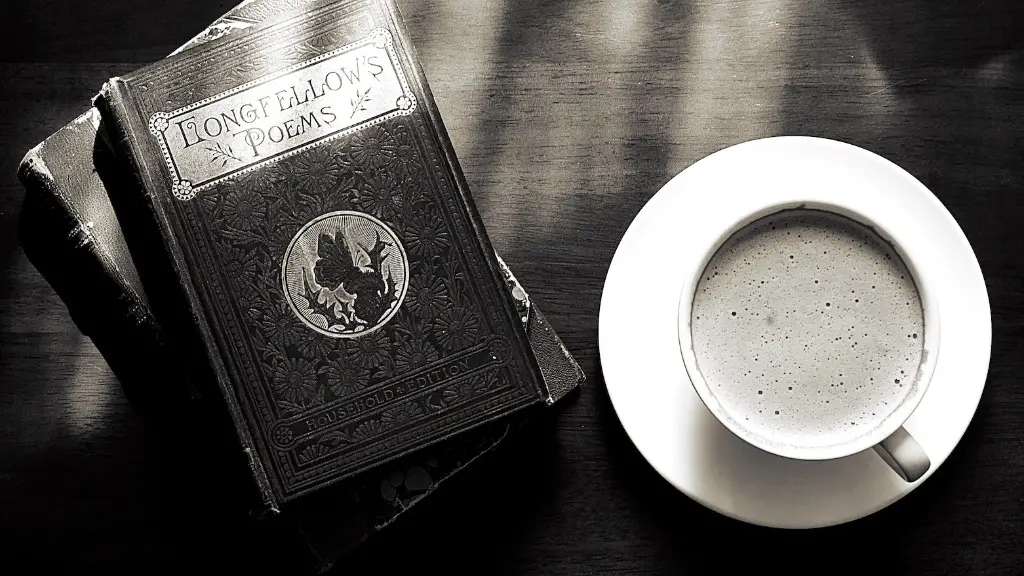A poetry book is a collection of poems by a single author and is an excellent way to express and share emotions and insights. But just how long should a poetry book be? The answer to that question is not quite cut and dry.
On one hand, there is really no prescribed length for a poetry book. The length of the book would all depend on the author’s goals for the project, the audience they are targeting, and the amount of poems they wish to include. Typically, poetry books are between 30 and 50 pages long, with each page organized into a few stanzas or lines of verse. Some moderately sized books may contain up to 150 pages of content.
However, there are some common recommendations that are usually given by publishing companies and other organizations. Publishers usually require new authors to submit a poetry book that contains a minimum of 50 pages. Of course, this means that authors can also choose to aim for books that are much longer, but books that are too short are usually not accepted.
Many experts in the publishing industry also recommend that authors condense their poems down to their most meaningful or relevant passages. In other words, it’s best not to include every poem that you’ve ever written, and instead choose ones that are related to each other and tell a cohesive story. That way, the overall length of the poetry book won’t overwhelm readers and the messaging within the collection will have more impact.
It’s important to remember that the length of a poetry book can also depend on the type of poetry being written. Compared to other genres, poetry generally requires less words to relay an entire story. In addition, some particular forms of poetry, such as haikus, require much fewer words than others that require a free-flowing structure.
It’s also important to consider the final format that is chosen for the poetry book. If the book is to be released as an ebook, then it’s easier to determine how long it should be, as readers don’t tend to pay attention to its physical length. On the other hand, if the book is to be printed, then authors might want to keep the length on the shorter side in order to minimize ink and paper costs.
How to Organize a Poetry Collection
Organizing a poetry collection is an important step in the writing process as it helps to create a sense of flow and progression for the reader. Generally, authors organize poetry collections by theme. This helps to create a cohesive narrative throughout the book, rather than a jumble of unassociated thoughts and pieces. Many authors also choose to order poems according to a certain structure, such as by the length of the poem or by an emotional progression.
Moreover, when authors publish poetry books, they often divide up their collections into sections. Grouping poems into sections can help to give readers an idea of what to expect and make it easier for them to locate specific pieces that stand out to them. Since sections provide beginners with a sense of context, authors should make sure to place related works into the same sections and add a brief description at the top of sections to give readers a sense of what the poems featured within them will be about.
Moreover, ending a poetry collection can also be important. Finishing a book on a high note can leave a lasting impression on a reader and signify that an end was reached and a full journey was experienced. Some authors even group certain works together near the end of the book to signify the conclusion of the book’s story, such as placing all of the most powerful poems together near the end.
Law and Rights
Copyright Rules: It’s also important to consider the legal rights and considerations when publishing a poetry book. Authors who intend to publish their works commercially should be aware of copyright laws, which will help them protect their rights to their works. Generally, once a poem is written and published, the author retains full rights to their work, and no one else can alter or reprint their works without the author’s permission.
Fair Use Rules: Authors may also want to familiarize themselves with fair use rules. This provides them with the ability to use copyrighted material from other sources which could, for example, include a famous quote from another author’s work, or a poem by a well-known poet. Fair use rules can help authors ensure that their books remain legally compliant, as well as help them provide contextual information or acknowledgements within their works.
Other Legal Issues:Furthermore, authors should also make sure that they are aware of other legal issues that could arise if they choose to publish their work. This includes issues such as plagiarism, libel, or any sensitive political or sociocultural topics. By familiarizing themselves with these issues, authors can help to ensure that their books remain legally compliant.
Promoting a Poetry Book
Promoting a poetry book is an integral part of the process and will help to bring the author’s hard work to fruition. Authors can promote their poetry books through a variety of methods, such as through book readings, traditional publishing methods, and through social media.
Social Media:Social media is an especially useful tool for authors, as everyone from major media outlets to potential readers can be reached through this medium. Authors can post excerpts from their work, along with engaging questions or interesting insights. Additionally, authors can also reach out directly to potential readers, such as by sending messages to blogs and TV shows that might be interested in their works.
Attending Events:Another way authors can promote their works is to attend book readings and other events. Authors can use these events to connect with readers, media outlets, and other industry professionals. Additionally, if their events are successful, authors may be offered additional opportunities to host readings, speak at conferences, or take part in other forms of promotion.
Traditional Publishing:More traditional methods of book promotion can also be useful, such as working with publishers and launching marketing campaigns. Publishers can help authors to reach out to a large group of readers and create a buzz about their book. Additionally, authors can launch their own promotional campaigns, such as through the use of book trailers, podcasts, or interviews with local press.
Conclusion
Overall, a poetry book can be as long or as short as an author wishes, as long as it meets the minimum requirements of the publisher. Authors should take into account the format of the book, the type of poetry, as well as the audience they are targeting to decide upon a suitable length. In addition, authors should organize and structure their works in an accessible and meaningful way, while also familiarizing themselves with legal considerations to ensure that their works are compliant with the law. Finally, promotions and marketing strategies can also be useful in getting the author’s works out into the world.




